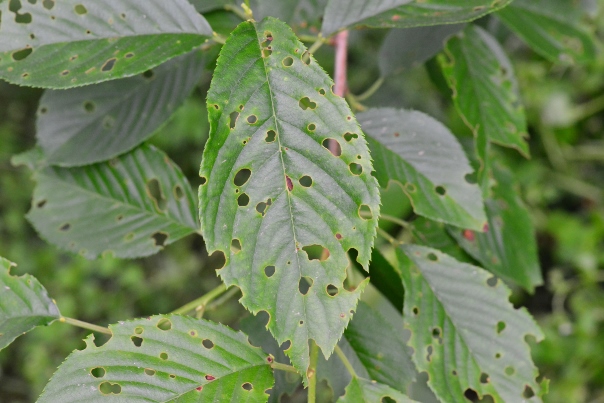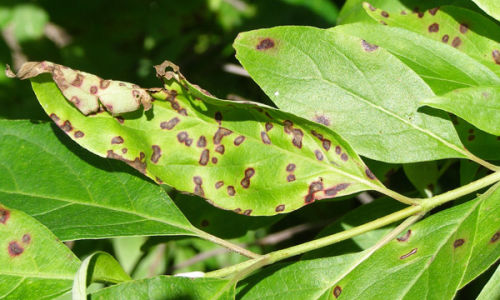Written by Jackie Rhoades and published on https://www.gardeningknowhow.com/.
We talk a lot about how to spot tree risk in the form of tree location or position, but when it comes to spotting tree diseases, you need to take a closer look. Leaf spot diseases are one of the least talked about tree diseases, but they are just as important to look out for as EAB or Dutch Elm.
Table of Contents
Plants With Spotted Leaves: Fungal Leaf Spot Treatments
From indoor and outdoor gardeners alike, one of the most common gardening questions is, “Why do my plants have spotted and brown leaves?”. And while there are many reasons for plain old brown spots, when those spots look like little brown bull’s-eyes, the answer my friends is fairly simple, organism-wise that is. Those plant leaf spots are caused by one of nature’s most basic organisms: a fungus.

Plants with Spotted Leaves
Fungal leaf spot can be found in your outdoor garden as well as on your houseplant. Spotted leaves occur when fungal spores in the air find a warm, wet, plant surface to cling to. As soon as that microscopic spore gets comfortable in its new home, sporulation (the fungal method of reproduction) occurs and the tiny brown fungal leaf spot begins to grow. Soon the circle grows large enough to touch another circle and now the fungal leaf spot looks more like a blotch. Eventually the leaf turns brown and falls to the soil where the spores sit and wait for the next available warm, wet, plant surface so the fungal leaf spot process can begin again.
Preventing Plant Leaf Spots
There are a few easy steps you can take to prevent the problem in your garden or on your houseplant. Spotted leaves or the causal fungus need two things to flourish: moisture and poor air circulation. For your houseplant, spotted leaves can be prevented by watering the soil and not the foliage. Leave enough space between your pots for good air circulation.
How to Treat Leaf Spot Fungus
No matter how diligent you are, the day will come when those tiny brown circles appear on the leaves of your plant so it’s important to know how to treat leaf spot fungus. As soon as you see plant leaf spots, treatment begins.
For houseplants, isolate the pot immediately to prevent the fungus from spreading. Remove any leaf that has been affected. Stop misting.
In the garden, the plant’s leaf spot treatment depends on preference.
For organic treatment, there are several safe and convenient treatments available. Most contain sulfur or copper octanate. Or you can try a more traditional treatment by spraying with a mild solution of bicarbonate of soda (baking soda), using ½ teaspoon per gallon (2.5 mL. per 4 L.) of water.
For those gardeners who have no objection, many all-purpose fungicides are available. Please read the label carefully before applying.
Original post here https://www.gardeningknowhow.com/plant-problems/disease/plant-leaf-spots.htm.

